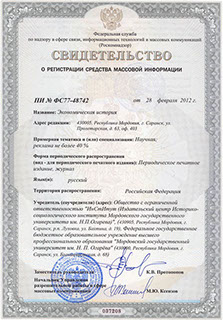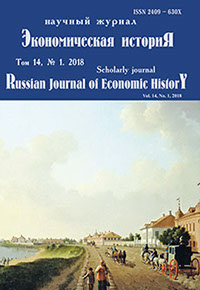Экономическая историЯ
Russian Journal of Economic History
ISSN 2409-630X (Print)
ISSN 2618-916X (Online)
Expert board:
- Scientific Council of RAS on economic history;
- Research and Educational Center «The economic history of Central Russia and the Middle Volga region» of Ogarev Mordovia State University;
- Center of Economic History of Lomonosov Moscow State University
Navigation
Certificate of registration

ISSN 2409-630X
DOI: 10.15507/2409-630X.040.014.201801.009-023
S. I. Kovalskaya
L. N. Gumilyov Eurasian National University Astana, Kazakhstan, e-mail: skovalsk@mail.ru,
ORCID http://orcid/org 0000-0001-7613-7597
POLITICAL AND SOCIO-ECONOMIC MODERNIZATION OF THE KAZAKH STEPPE IN THE FIRST HALF OF THE ХХ CENTURY IN KAZAKHSTAN AND FOREIGN HISTORIOGRAPHY
Introduction. The article is devoted to the analysis of the main approaches existing in domestic and foreign historiography on the process of modernization of the Kazakh steppe in its political and socio-economic format. The objectives of the study will be to analyze the impact on the nomadic Kazakh society of certain Soviet political and socio-economic experiments in Kazakhstan in this period. We will focus on the characteristics of the implementation of the NEP, land and water reform, collectivization, industrialization and the virgin soil campaign, although it will not be possible without historical excursions. The main method of investigation will be the historiographic analysis of the works of specialists in both domestic and foreign historiography in this field. Results. Nomadism as a form of economy eventually becomes an object of modernization. Because of modernization reforms, the nomadic people became victims of Soviet state-economic experiments. Discussion. Soviet modernization was carried out in Kazakhstan with reliance on the Russian-speaking population, as the core of Soviet modernization was accelerated industrialization, and the nomadic population did not have the skills of industrial labor. The modernization was superficial and incomplete. Conclusion. We concluded that in many positions today opinions of the foreign and Kazakhstan scholars have become closer, or even coincide. For example. Conclusions on the use of republican resources to please the center, unequal ethnic representation, the incompleteness of modernization reforms, the highest price for these reforms, etc.
Keywords: modernization, acculturation, Kazakh steppe, Russian Empire, Kazakhstan historiography, foreign historiography.
For citation: Kovalskaya S. I. Political аnd Socio-Economic Modernization оf the Kazakh Steppe in the First Half of the ХХ century in Kazakhstan and Foreign Historiography. Ekonomicheskaya istoriya = Russian Journal of Economic History. 2018; 14(1): 9–23. (In Russ). DOI: 10.15507/2409-630X.040.014.201801.009-023
© Ogarev Mordovia State University. History and Sociology Institute, 2017
68, Of. 411, Bolshevistskaya St., 430005, The editorial office of the scholarly journal «Russian Journal of Economic History»
Tel.: (8342) 24-25-90; 27-07-11, Fax: (8342) 24-25-90, E-mail: jurnal-econom-hist@isi.mrsu.ru
Designed by A. Napalkov, Email: napalkov@isi.mrsu.ru

